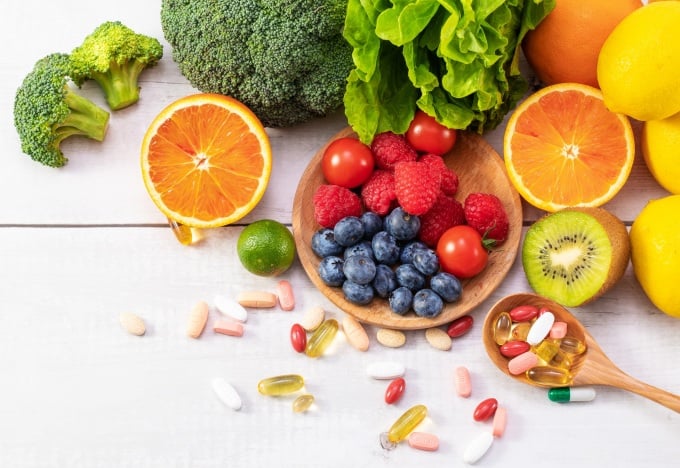The liver will function effectively if it has enough vitamins A, B, C… and essential nutrients in the diet.
Doctor, PhD Vu Truong Khanh (Head of Gastroenterology Department, Tam Anh General Hospital , Hanoi ) said that essential vitamins help the liver perform tasks such as digestion, protein synthesis, hormone production and filtering toxins in the diet and environment. Insufficient supplementation of essential vitamins can affect the health of the liver and disrupt its functions. Some vitamins and minerals can help the liver improve its health and improve the body's detoxification process.
Vitamin A
Dr. Khanh said that vitamin A deficiency is one of the most common nutritional deficiencies in the world . Vitamin A is involved in many metabolic processes in the liver. A lack of this vitamin can affect liver function.
Although vitamin A has some benefits for people with liver disease, it can be toxic to the organ in high doses. Therefore, people with chronic liver disease, especially those with cirrhosis, should only supplement vitamin A when prescribed by a doctor.

Vitamins are often found in fruits and vegetables, contributing to protecting liver health. Photo: Freepik
Vitamin D
More than 90 percent of more than 100 patients with chronic liver disease who participated in the study had some degree of vitamin D deficiency, according to research from the University of Tennessee at Memphis. Severe vitamin D deficiency is more common in people with cirrhosis, the researchers say. However, excess vitamin D, often caused by taking too many supplements, can cause loss of appetite, nausea and vomiting, and hypercalcemia.
Vitamin C and E
Vitamins C and E are antioxidants that can protect the body against potential damage from free radicals, toxic chemicals, and pollutants. Low levels of antioxidants can create an imbalance called oxidative stress. The resulting imbalance negatively affects body cells in general and liver cells in particular, leading to liver cell damage, especially in people with non-alcoholic fatty liver disease.
People with non-alcoholic fatty liver disease have low levels of vitamin E in their blood, due to oxidative stress. Vitamin E has some benefits for people with liver disease, but it can be dangerous if taken in excess. At doses above 1,200 IU per day, vitamin E can thin the blood and cause bleeding.
Vitamin B
Dr. Khanh notes that vitamin B is one of the best vitamins for liver function. Eating foods rich in vitamin B can help reverse the symptoms of some early-stage liver diseases such as alcoholic liver disease. Liver disease can cause deficiencies of vitamins B1, B6, and B12. A severe deficiency of vitamin B1 causes mental decline. People with a vitamin B6 deficiency can experience tingling and numbness due to nerve damage. A deficiency of vitamin B12 causes anemia. Most B vitamins cannot be stored in the body and must be consumed in a balanced diet of green vegetables, poultry, whole grains, fruits, etc.
Diet can provide the body with many antioxidants and support liver detoxification. However, people with chronic liver disease should pay attention to the amount of vitamins when supplementing, especially some vitamins such as vitamin E and vitamin A need to be prescribed by a doctor.
Emerald
Source link






![[Video] More than 100 universities announce tuition fees for the 2025–2026 academic year](https://vphoto.vietnam.vn/thumb/1200x675/vietnam/resource/IMAGE/2025/7/18/7eacdc721552429494cf919b3a65b42e)























































































![[Infographic] In 2025, 47 products will achieve national OCOP](https://vphoto.vietnam.vn/thumb/402x226/vietnam/resource/IMAGE/2025/7/16/5d672398b0744db3ab920e05db8e5b7d)





Comment (0)